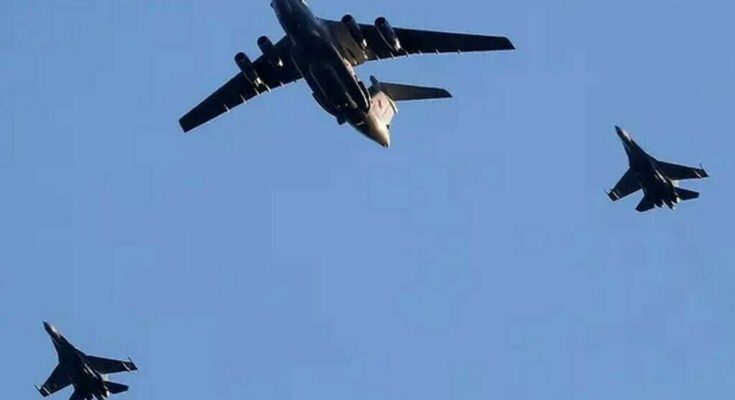Russia Claims Intercepting British Warplanes over Black Sea, Heightening Tensions
In a recent development that has raised tensions between Russia and the United Kingdom, Moscow has announced that it intercepted multiple British warplanes flying near its airspace over the Black Sea. The incident, which occurred earlier this week, marks another chapter in the ongoing confrontations between the two nations.
The ministry said the planes involved were two British Typhoon jets accompanied by an RC-135 reconnaissance aircraft.
“The Russian planes safely returned to their airfield. There was no violation of the Russian border,” said the ministry.
⇒Join us on Telegram for more Sure and Accurate football-winning tips every day...click here
Incidents involving Russian and Western aircraft have multiplied over the Black Sea and Baltic Sea in recent months, as Moscow pursues its offensive in Ukraine.
In May, Moscow said it had intercepted four American strategic bombers above the Baltic Sea in two separate incidents in the space of one week.
According to Russian defense officials, their fighter jets were scrambled to intercept a group of British military aircraft that had ventured close to Russian territorial waters. The Russian Defense Ministry stated that the incident took place in an area where they were conducting military exercises and emphasized that the intercept was conducted in a “safe and professional manner.”
However, the United Kingdom’s Ministry of Defense swiftly denied the Russian claims, stating that the Royal Air Force (RAF) had been conducting a routine training exercise over international waters and had not violated any nation’s airspace. British officials dismissed the Russian assertions as an attempt to stoke tensions and divert attention from other pressing issues.
This latest episode underscores the increasing frequency of such encounters between Russia and NATO nations in the region. The Black Sea has become a hotbed of military activity, with both sides conducting military exercises and surveillance operations in close proximity. The United Kingdom, along with its NATO allies, has regularly deployed military assets in the area to deter potential threats and demonstrate its commitment to regional security.
Russia, on the other hand, has accused NATO of expanding its presence near its borders, viewing it as a security threat. The Kremlin argues that these military exercises and patrols encroach upon its sovereignty, necessitating a robust response to protect its national interests.
Tensions between Russia and the United Kingdom have been heightened in recent years due to various geopolitical disputes, including the poisoning of former Russian spy Sergei Skripal in Salisbury, England, and the subsequent diplomatic fallout. These incidents have strained bilateral relations and led to reciprocal sanctions.
As the situation escalates, both sides have called for calm and de-escalation. Diplomatic channels remain open, albeit strained, as the two nations attempt to address their differences through dialogue. The interception of British warplanes over the Black Sea is likely to further strain relations and complicate efforts to find common ground.
The international community, particularly NATO allies, will closely monitor this situation and assess the implications of these encounters on regional stability. It is crucial for all parties involved to exercise restraint, respect international norms, and engage in meaningful dialogue to prevent any further escalation of tensions in the Black Sea region.
As developments unfold, the world waits with bated breath to see whether Russia and the United Kingdom can find a way to alleviate their differences and pursue a more constructive path forward.




